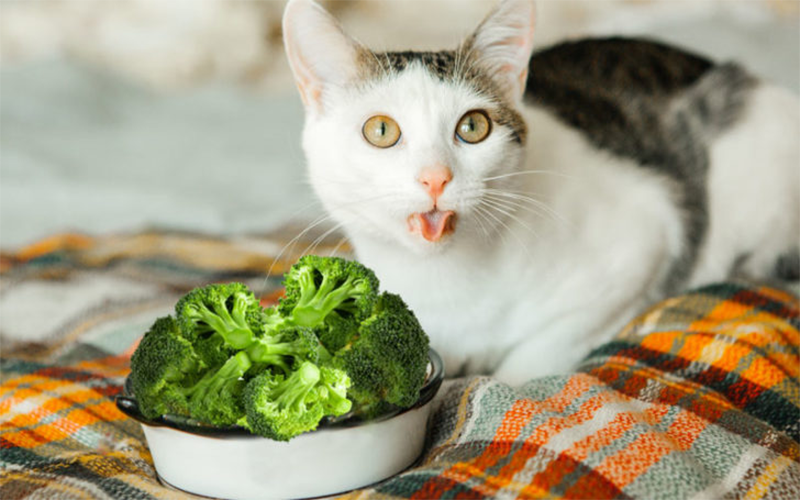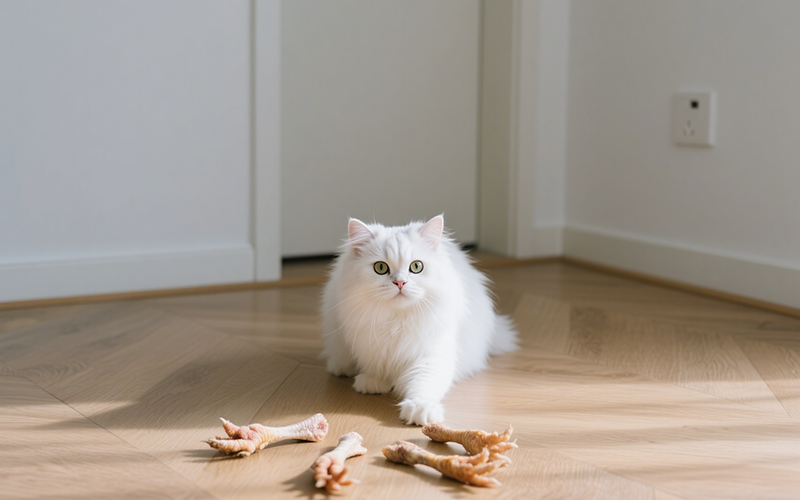Can Cats Eat Broccoli? A Guide to Broccoli and Your Cat’s Health
- 17 Feb 2025 17:15
As cat owners, we often find ourselves sharing meals with our pets and wondering which human foods are safe for them. Broccoli, a popular vegetable known for its health benefits in humans, may raise the question: can cats eat broccoli? The short answer is yes, cats can eat broccoli, but there are some things you should know before offering it to your feline friend.

Is Broccoli Safe for Cats?
Broccoli is not toxic to cats and can be a safe and nutritious addition to their diet in small amounts. While cats are obligate carnivores and do not require vegetables in their diet, some cats may enjoy the taste and texture of broccoli. In fact, broccoli offers certain health benefits that may complement your cat’s regular diet.
Benefits of Broccoli for Cats
Rich in Nutrients: Broccoli is packed with essential nutrients like vitamin C, fiber, vitamin K, and folate, all of which are important for maintaining overall health. While cats don’t require these nutrients in large amounts, they can still benefit from small servings of broccoli.
Antioxidants: Broccoli is known for its high antioxidant content, which can help support your cat’s immune system and protect against cell damage caused by free radicals.
Digestive Health: The fiber in broccoli can promote digestive health by supporting healthy bowel movements and reducing the risk of constipation in cats.
Low in Calories: Broccoli is low in calories, making it a good option for cats that are watching their weight or are prone to obesity. It can provide a healthy treat without adding too many extra calories to your cat’s diet.
Hydration: Since broccoli has a high water content, it can also help with hydration, especially if your cat is not drinking enough water on its own.
Potential Risks of Broccoli for Cats
While broccoli is safe for most cats, there are some risks and precautions to keep in mind:
Gastrointestinal Upset: Cats have sensitive digestive systems, and introducing new foods, including broccoli, could lead to stomach upset, vomiting, or diarrhea in some cats, especially if they are not used to eating vegetables. Start with a small amount to see how your cat’s digestive system reacts.
Choking Hazard: Like many vegetables, broccoli stalks or large pieces of broccoli can be a choking hazard for cats. Always cut the broccoli into small, bite-sized pieces to prevent any choking risks.
Gas and Bloating: The fiber in broccoli can sometimes cause gas or bloating, particularly in cats who are not accustomed to eating plant-based foods. If you notice your cat becomes gassy or uncomfortable after eating broccoli, it’s best to stop offering it.
Oxalates: Broccoli contains oxalates, which are naturally occurring substances that can bind with calcium and form crystals in the body. While this is not usually a problem for cats in small quantities, consuming large amounts of oxalates over time could contribute to kidney issues in susceptible cats.
Possible Pesticides: As with any produce, broccoli may contain pesticides or other harmful chemicals if not washed properly. Always wash the broccoli thoroughly to remove any potential pesticides before offering it to your cat.
How to Safely Offer Broccoli to Your Cat
If you want to offer broccoli to your cat, it’s important to do so safely:
Cooked vs. Raw: It’s generally safer to offer cooked broccoli to your cat, as it’s easier to digest. Steaming or boiling the broccoli (without any seasoning) is the best option. Raw broccoli can be harder for your cat to digest and may be more likely to cause gastrointestinal upset.
Cut into Small Pieces: Always cut broccoli into small, bite-sized pieces to reduce the risk of choking and to make it easier for your cat to eat.
Start Slow: Introduce broccoli to your cat’s diet gradually. Offer a small piece first to see how they respond. Monitor for any signs of digestive upset, and if you notice anything unusual (such as vomiting or diarrhea), stop offering broccoli and consult your vet.
Avoid Seasonings: Do not season the broccoli with any spices, garlic, onion, or butter. These ingredients can be harmful to cats and should never be added to their food.
Use as an Occasional Treat: Broccoli should be considered an occasional treat and not a regular part of your cat’s diet. Cats need a protein-based diet to thrive, so vegetables should only be given in small amounts alongside their regular meals.
Signs of Food Sensitivity in Cats
If you’re introducing broccoli for the first time, watch for any signs of food sensitivity or allergic reactions. Common signs to look out for include:
Vomiting
Diarrhea
Bloating or gas
Loss of appetite
If your cat exhibits any of these symptoms after eating broccoli, discontinue offering it and consult with your vet.
Healthier Alternatives to Broccoli for Cats
If your cat is not a fan of broccoli or if you’re looking for other healthy treat options, consider these alternatives:
Cooked Carrots: Like broccoli, carrots are a nutritious vegetable that many cats enjoy. They are high in fiber and vitamin A, which supports vision and overall health.
Cooked Pumpkin: Pumpkin is a great option for digestive health and can help with constipation. Cats love the soft texture, and it’s safe in small amounts.
Cucumber: Cucumbers are another low-calorie, hydrating treat for cats. They’re easy to digest and are often well-tolerated by cats.
Catnip: Catnip is a natural and safe treat that many cats enjoy for its stimulating and relaxing effects.
Conclusion
Can cats eat broccoli? Yes, cats can eat broccoli in small amounts, and it can provide several health benefits such as fiber, antioxidants, and nutrients. However, it’s important to offer it in moderation and prepare it properly. Always cut the broccoli into small pieces, avoid seasonings, and watch for any signs of digestive upset after introducing it.
If you’re unsure about what foods are safe for your cat or need guidance on your cat’s overall health and nutrition, consider using PettureX. PettureX is an AI-powered pet health assistant that offers 24/7 online consultations, helping you make informed decisions about your cat’s diet and overall well-being.
Related

Can Cats Eat Egg Yolk Raw? A Vet's In-Depth Guide to Feline Nutrition & Safety
- 10 Jun 2025
Can Cats Eat Dog Kibble? Unpacking the Nutritional Mismatch!
- 29 May 2025
Can Cats Eat Deli Turkey? Slicing Through the Facts for Your Feline!
- 29 May 2025
Can Cats Eat Deer Meat? Exploring Venison for Your Feline!
- 28 May 2025
Can Cats Eat Corned Beef? Unpacking This Salty Human Delicacy!
- 28 May 2025
Can Cats Eat Cooked Rice? The Grain Truth for Your Feline Friend!
- 27 May 2025
Can Cats Eat Cornbread? A Crumb of Truth for Curious Cat Owners!
- 27 May 2025
Can Cats Eat Cooked Meat? Sizzling Facts for Your Feline's Feast!
- 26 May 2025
Can Cats Eat Chili? Spicing Up the Truth About This Human Dish!
- 26 May 2025
Can Cats Eat Chicken Feet? A Paw-sitive or Negative Treat?
- 24 May 2025
